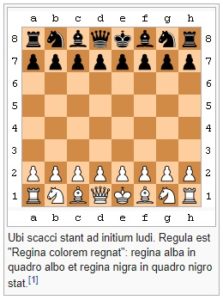 In addition to reading a lot of Latin every day, I’ve reprised the working of chess problems. So, when I was looking back through the blog for something I had written I found some posts that I made last year at this time when I was doing some chaplain work at the Guantanamo Bay Naval Station. One of them linked to a page about chess … in Latin. HERE
In addition to reading a lot of Latin every day, I’ve reprised the working of chess problems. So, when I was looking back through the blog for something I had written I found some posts that I made last year at this time when I was doing some chaplain work at the Guantanamo Bay Naval Station. One of them linked to a page about chess … in Latin. HERE
Animi caussa… the names of the pieces.
- 1 rex, sive scaccus
- 1 regina (vel virgo, vel amazon, vel domina), sive dama (unde damicus ludus), vel fercia
- 2 turres, vel elephantes, sive rochi
- 2 episcopi (vel satellites, vel signiferi, vel cursores, vel sagittiferi), sive alf?ni
- 2 equites
- 8 pedites, vel pedini, sive pedones.
And how does the regina move, you ask?
Regina est potentissima omnium militum. Ei sunt potestates et episcopi et turris. Potest moveri passim quemlibet numerum quadratorum prorsum (sive sursum), rursum (sive deorsum), dextrorsum, sinistrorsum, et quemlibet in obliquum.
There are also descriptions of the history of the game, the notation for recording moves, etc.
If you are at all interested in chess and Latin, check it out.


































When playing as white, I always start to play with Regina’s gambit opening. :-)
Which is very offensive and thus for me the very best. ??
“Sagittiferri” pro nomine “episcopi”? Hoc numquam audivi, utrum autem nomen mihi placeat. Germanice nominantur “läufer”, quod nomen nemo praeter Germanos aptum arbitrari possit.
Evans Gambit!! Love playing the Evans Gambit. I spend about 45 minutes every day practicing tactics. I don`t like short time controls like most sites have, but I do play online correspondence.
Melius scripsissem “alterutrum” pro “utrum”, et certe pro “läufer” “Läufer”. Mea culpa!
How profound:
+ 1 regina (vel virgo, vel amazon, vel domina), sive dama (unde damicus ludus), vel fercia
AND
+ Regina est potentissima omnium militum. Ei sunt potestates et episcopi et turris. Potest moveri passim quemlibet numerum quadratorum prorsum (sive sursum), rursum (sive deorsum), dextrorsum, sinistrorsum, et quemlibet in obliquum.
The Virgin queen is the most powerful of all … she has the powers of of bishops and of rooks /towers/sentries/warders …
Thank you, Dear Fr Z, for this most interesting and riveting Post on Things Chess and Things Latin.
Apropos that, should any of your myriad Readers wish to sing “Waltzing Matilda”, in Latin, here it is:
https://zephyrinus-zephyrinus.blogspot.com/search?q=WALTZING+MATILDA
G’day Mate !!!
When I saw that a Rook could be an elephant in Latin, I thought: that’s confusing- in Indonesian, a Gajah (an elephant) means a Bishop.
So I looked up on English Wikipedia the various names that different languages give to the piece called a Bishop in English.
The Bishop is an Elephant in Arabic, Armenian, Azerbaijani, Basque, Bengali, Catalan, Chinese, Hausa, Indonesian, Malayalam, Persian, Russian, Spanish, Thai, Turkish, Ukrainian, Urdu and Vietnamese.
He is a Camel in Hindi, Marathi and Mongolian, and a Tortoise in Georgian.
In some places he is a human being. A Bishop is a Bishop in English, Icelandic, Irish, Japanese, Korean, Latvian, Portuguese, Scottish Gaelic and Welsh.
He is a Runner in Afrikaans, Danish, Dutch, German, Hebrew, Hungarian, Norwegian and Swedish. He is a Messenger or Courier in Finnish and Polish, a Military Commander or Officer in Albanian, Belorussian, Bulgarian, Greek and Lithuanian, a Standard Bearer in Italian, a Hunter in Macedonian, Serbo-Croatian and Slovene and a Rifleman in Czech and Slovac. He is a Minister in Javanese and Tamil but a Jester or a Fool in French and Romanian. He is a Spear in Estonian.
It is interesting that in Latin (putting together the info from Latin Wikipedia and from English Wikipedia) he can be a Standard Bearer, a Fool, a Runner, an Elephant (in an Arabic-derived word) a Bishop, a Guard or an Archer, thus following most of the naming conventions in other languages.
(I’m guessing that Italian alfiere and French fou (< fol) are folk-etymologies of Arabic (al) fil – elephant, which have then been translated into Latin signifer and stultus.
Grant M: Thanks.
Roman Catholic Guerilla: Ah, the Evans Gambit- a fine choice, a solidly assertive line of the Giuoco Piano.
When playing defense, the Sicilian and the Dragon Variation with its fianchettoed bishop is well known, but can still trip up an overconfident opponent. And it has a certain ominous look, lurking there in the corner.
“Never go in against a Sicilian when death is on the line.” Couldn’t resist that one.